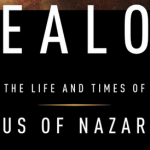Ever since I finished The Tudors long ago, I’ve been trying to catch up on The Borgias. I just watched all of Season 2 in a single week (my library’s limit for in-demand DVDs), and the show’s gruesome finale left me mulling over this twisted, power-hungry clan.
I realize how loose historical interpretations can get, especially on Showtime. But the interpretation of the Borgia siblings’ relationships transcends distinctions of fact and fiction, drawing on historical speculation and biblical allusions to resonate with 21st-century viewers like me.
Consider the case of elder brother Cesare and younger brother Juan, both of whom are illegitimate sons of Pope Alexander IV and both of whom play an essential role in the Borgia pope’s policies. Cesare wears the cardinal’s cloth while Juan leads the papal army. The brothers struggle with bitter and often violent rivalry. The plot also deals with Cesare’s dissatisfaction with his assigned vocation and Juan’s questionable competence as a military man.
In Season 2’s final episode, their father (both holy and earthly, in this case), begs Cesare to guide Juan. Cesare scoffs, “Am I, then, my brother’s keeper?” The pope’s answer is a resounding yes, and while history provides a less certain answer about the nature of Juan’s demise, the Showtime series uses the Cain and Abel comparison to foreshadow the fratricide.
In the same episode, Juan refers to himself as “the prodigal son,” their father’s favorite in spite of continued failures, both personal and military. These metaphors — the brother’s keeper and the prodigal son — provide different outcomes in their biblical narrative counterparts, but both illustrate the tension that seems almost inherent in brotherly relationships.
I keep coming back to the questions these metaphors pose for contemporary siblings, those for whom primogeniture and tradition no longer bind them to certain social stations. In both instances (as elsewhere in the Bible), the stories highlight the finitude of parental resources, a theme that dominates the Borgias’ schemes.
The pope’s offspring are used to forge alliances, win battles, and build the treasury. Yet in this powerful, wealthy family, the siblings squabble about the distribution of gifts. Each one is concerned that the others are getting something more, something better. Each one is convinced that the other is somehow more favored and less deserving. Neither Cesare nor Juan takes his portion gratefully, without bitterness or petty squabbling.
Their relationship, and the mixed metaphors it references, takes on new meaning in the context of their paternity: the bastard sons of a religious leader who claims infallibility. Their very origins are twisted by sin, and yet Jeremy Irons as the pope offers a compelling performance as a man sincerely (though misguidedly) devoted to both his faith and his family.
By the conclusion of Season 2, Cesare murders Juan, and it’s hard for viewers to feel terribly sympathetic to the younger brother. (I won’t spoil the entire plot here with details of Juan’s failings.) Cesare confesses, and a heartbroken pope assumes some of the blame himself, realizing too late that he saw his children as he wanted them to be, not as they were. In one of the episode’s most poignant scenes, the father buries Juan, but we see him carrying a small, beautiful child instead of a broken and debauched man.
How often, I wonder, do we see only our own dreams for our children, and in doing so, warp their own visions? How much do we accept that God — the one and only true Father — offers each of us a calling better than we can imagine? Or do we, like the Borgia pope, scheme and plan to force our own way, setting brother against brother and valuing our children only insofar as they reflect well upon us?
Beneath the lavish costumes and the gruesome storylines, beyond its historical references, The Borgias is an old story about whom we love — and how.











